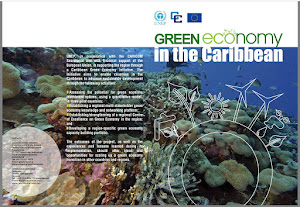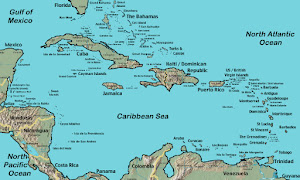Bonaire (pop. 14,500), a small island off the coast of Venezuela, is famous for its beautiful marine reefs, which are visited by 70,000 tourists every year.
 |
| Bonaire |
What many of the tourists don't realize is that the majority of the electricity powering their needs comes from renewable energy. Yet for the residents of Bonaire, the switch from fossil-fueled to renewable energy systems has made a world of difference.
Like many Caribbean islands, Bonaire originally relied on diesel fuel to generate electricity for residents, with a peak demand of 11 megawatts (MW). This fuel had to be shipped in from other nations, resulting in high electricity prices for Bonaire residents, along with uncertainty about when and how much prices might increase with changing fuel costs.
In 2004, everything changed when a fire destroyed the existing diesel power plant. Although tragic, the situation provided an opportunity for Bonaire to consider what kind of new electricity system to build. Temporary diesel generators were rented to provide power for the short term. Meanwhile, the government and local utility began working together to create a plan that would allow Bonaire to reach a goal of generating 100 percent of its electricity from renewable sources.
Bonaire's Electricity System Transformation
The result is a transformed electricity system on Bonaire. The island is now home to 12 wind turbines with a total of 11 MW of wind power capacity, which contribute up to 90 percent of the island's electricity at times of peak wind, and 40-45 percent of its annual electricity on average.
Battery storage (6 MWh) is included in order to take advantage of available power in times of excess wind, and provide that stored electricity in times of low wind. The battery also boosts the reliability of the overall system—it is capable of providing 3 MW for over two minutes, allowing time for additional generation to be started when there is a sudden drop in wind.
The Bonaire system also includes 14 MW of diesel generation, five total generators, which provide the necessary power to meet the load when there is not enough wind power available. The generators are equipped to run on both traditional diesel as well as biodiesel. The next steps in the island's energy transformation involve using local algae resources, grown in the large salt flats on the island, to create biofuel, which can then be used in the existing generators. This will allow Bonaire to operate a 100 percent renewable electricity system—with on average 40–45 percent from wind and 55-60 percent from biodiesel.
The new electricity system led to more reliable electricity, more employment opportunities, reduced dependence on oil (and its fluctuating prices), and a reduction in electricity bills. Bonaire residents currently pay $0.22/kWh for electricity, much lower than prices on other nearby Caribbean islands, which are often $0.36/kWh or above.
When oil prices spiked in 2008, while Bonaire was still using temporary diesel generators before making its transition to renewables, electricity prices on the island reached $0.50/kWh. The new electricity system also created jobs for the construction and ongoing operation of the wind farm, and for research and development of algae production capabilities and conversion to biofuel. Additional employment opportunities will be created for continuing algae production and operation of the biodiesel plant.
The success of the updated electricity system on Bonaire provides an important example to other nearby islands of the opportunity to achieve high levels of renewable energy penetration.
http://www.businessinsider.com/bonaire-goes-renewable-energy-2015-1






